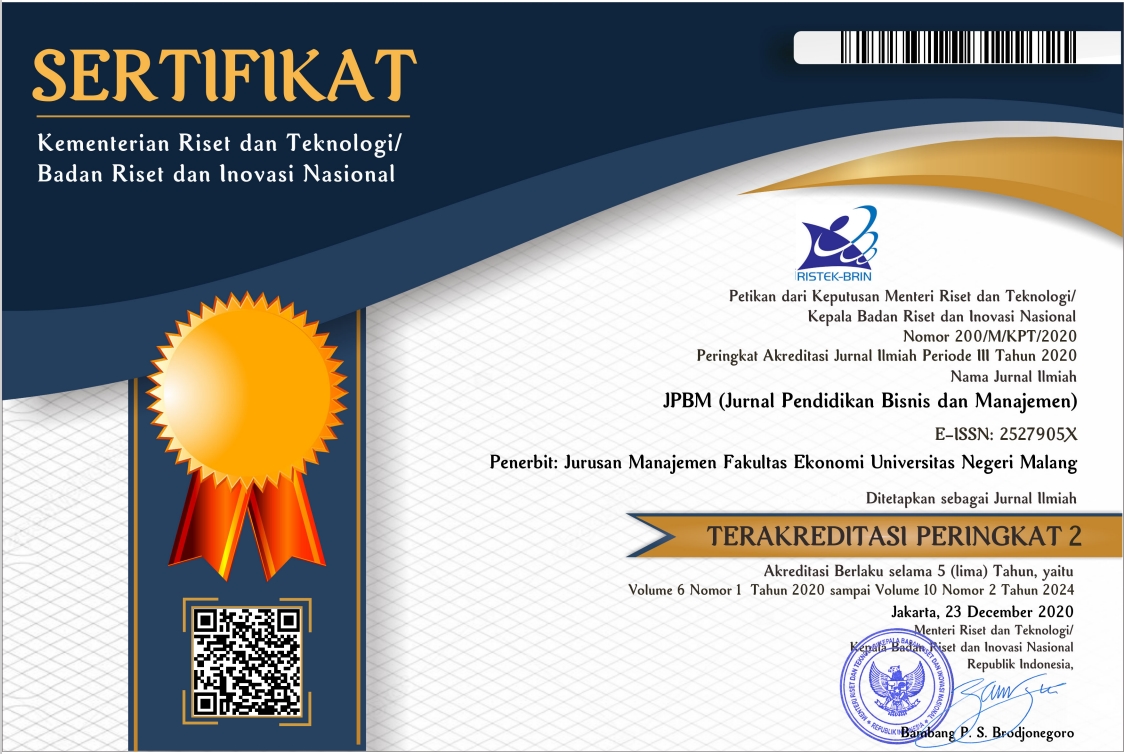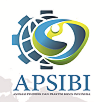Does Teaching Factory Matter for Vocational School Students?
Abstract
This research aims to understand the planning, implementation, relevance to student competency skills, as well as supporting and inhibiting factors of the teaching factory. This study involved a qualitative descriptive to gain a better understanding of the phenomenon and incorporated with observation technique, interviews, and documentation. The data in this research was divided into two: primary and secondary data. The primary data were collected from selected informants, and the secondary data was gathered from supporting documents in this research. The collected data further analyzed using the triangulation technique for validity and data reduction to provide a conclusion. The findings indicate that planning is realized by creating an organizational structure that manages the teaching factory. In addition, in planning students to practice in the teaching factory lab and carry out the tasks in the lab, for relevance to the competency skills in the classroom according to the existing basic competence which relevant to the existing practice in the teaching factory lab for the supporting factors, the facilities and infrastructure are already supportive. The human resources are adequate, and the inhibiting factor in terms of assistance from teachers in the lab is still lacking.
Keywords: Teaching factory, Online business, Marketing, Students’ activities
Full Text:
PDFReferences
Apriana, D., Kristiawan, M., & Wardiah, D. (2019). Headmaster’s competency in preparing vocational school students for entrepreneurship. International Journal of Scientific & Technology Research, 8(8), 1316-1330.
Buttice, V., Colombo, M. G., & Wright, M. (2017). Serial crowdfunding, social capital, and project success. Entrepreneurship Theory and Practice, 41(2), 183-207.
Cahyaningrum, N., & Agus, H. S. (2020, February). Implementation of Learning Teaching Factory Clothes SMK N 3 Malang. In 2nd International Conference on Social, Applied Science, and Technology in Home Economics (ICONHOMECS 2019) (pp. 269-274). Atlantis Press
Chowdhury, F., Terjesen, S., & Audretsch, D. (2015). Varieties of entrepreneurship: institutional drivers across entrepreneurial activity and country. European Journal of Law and Economics, 40(1), 121-148.
Dewi, K. C., Ciptayani, P. I., & Surjono, H. D. (2018). Modeling Vocational Blended Learning Based on Digital Learning Now Framework. Turkish Online Journal of Educational Technology-TOJET, 17(2), 89-96.
Diwangkoro, E. (2020). Development of teaching factory learning models in vocational schools. In Journal of Physics: Conference Series (Vol. 1456, No. 1, p. 012046). IOP Publishing.
Freeman, R., & Lewis, R. (2016). Planning and implementing assessment. Routledge
Hasan, A., & Pardjono, P. (2019). The Correlation of Higher Order Thinking Skills and Work Readiness of Vocational High School Students. Jurnal Pendidikan Teknologi dan Kejuruan, 25(1), 52-61.
Hofstein, A. (2017). The role of laboratory in science teaching and learning. In Science education (pp. 355-368). Brill Sense.
Kirillov, A. V., Tanatova, D. K., Vinichenko, M. V., & Makushkin, S. A. (2015). Theory and practice of time-management in education. Asian Social Science, 11(19), 193-204.
Lent, R. W. (2018). Future of work in the digital world: Preparing for instability and opportunity. The Career Development Quarterly, 66(3), 205-219.
Maryanti, N., Rohana, R., & Kristiawan, M. (2020). The Principal’s Strategy In Preparing Students Ready To Face the Industrial Revolution 4.0. International Journal of Educational Review, 2(1), 54-69.
Murniati, A. R., Usman, N., & Azizah, A. (2016). Vocational School-Industry Partnership in Improving Graduate Competency. Jurnal Ilmiah Peuradeun, 4(3), 269-280.
Romlah, O. Y., & Latief, S. (2021). Empowering the Quality of School Resources in Improving the Quality of Education. Bulletin of Science Education, 1(1), 37-41.
Samani, M. (2018, July). Vocational education in the era of industry 4.0: an Indonesia case. In International Conference on Indonesian Technical Vocational Education and Association (APTEKINDO 2018) (pp. 45-47). Atlantis Press.
Silverman, D. (Ed.). (2020). Qualitative research. Sage Publications Limited
Stachová, K., Papula, J., Stacho, Z., & Kohnová, L. (2019). External partnerships in employee education and development as the key to facing industry 4.0 challenges. Sustainability, 11(2), 345
Suleman, F. (2018). The employability skills of higher education graduates: insights into conceptual frameworks and methodological options. Higher Education, 76(2), 263-278.
Sulistiani, S., & Yulianto, B. (2019, December). Employability Skills of Vocational Graduates: Implementation of Curriculum IQF Level 2. In 3rd International Conference on Education Innovation (ICEI 2019) (pp. 278-282). Atlantis Press.
Wheelahan, L., & Moodie, G. (2017). Vocational education qualifications’ roles in pathways to work in liberal market economies. Journal of Vocational Education & Training, 69(1), 10-27.
Yoto, Y., & Marsono, M. (2020). Implementation of Work-Based Learning at Teaching Factory in Vocational Education. Teknologi dan Kejuruan: Jurnal Teknologi, Kejuruan, dan Pengajarannya, 43(2), 150-155.
Refbacks
- There are currently no refbacks.
JPBM (Jurnal Pendidikan dan Bisnis Manajemen) is licensed under a Creative Commons Attribution-NonCommercial-ShareAlike 4.0 International License.
JPBM (Jurnal Pendidikan dan Bisnis Manajemen) is abstracted and indexed in :
















